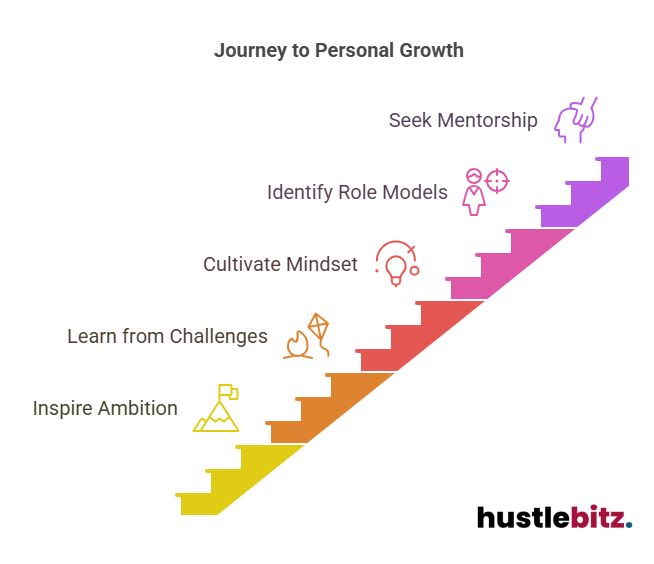Leveraging role models is a strategic approach to ignite motivation and achievement. These individuals exemplify dedication, resilience, and success, creating an emotional connection that inspires personal growth. By observing their journeys, individuals can identify aspirational traits and applicable strategies for overcoming obstacles. Role models foster a belief in attainable goals, transforming aspirations into concrete objectives. Furthermore, their stories emphasize perseverance, encouraging an achievement mindset and resilience in the face of setbacks. By aligning one’s goals with those of relatable figures, a powerful motivation feedback loop emerges. Exploring these concepts further reveals additional insights into effective engagement with role models.
Key Takeaways
- Role models inspire ambition by showcasing attainable success through their values and achievements, fostering motivation in others.
- Examining the challenges faced by role models highlights resilience and the importance of learning from setbacks in personal growth.
- Engaging with success stories creates an achievement mindset, encouraging individuals to view obstacles as opportunities for learning and self-improvement.
- Identifying relatable role models enhances the belief that success is achievable, instilling confidence and encouraging goal setting.
- Mentorship from role models provides guidance and strategies for overcoming personal challenges, reinforcing the value of perseverance and adaptability.

The Power of Role Models
Role models possess a profound ability to inspire and motivate individuals by exemplifying the values, behaviors, and achievements that others aspire to emulate. The influence dynamics at play when individuals observe role models can significantly shape their personal values and aspirations.
Through social comparison, individuals assess their own progress and capabilities against those they admire, fostering a sense of ambition and purpose. This comparison often serves as a catalyst for personal growth, urging individuals to strive for higher goals.
The cultural significance of role models cannot be understated; they reflect societal norms and ideals, encouraging individuals to align their aspirations with broader cultural values. For instance, a community may uplift figures who embody resilience and integrity, thereby encouraging these attributes in its members.
The psychological impact of seeing someone succeed against the odds can be transformative, instilling a belief that similar achievements are attainable. Moreover, role models can effectively bridge the gap between aspiration and reality. By showcasing their journeys, they demystify the process of success, making it more relatable and achievable for others.
Individuals often find solace in knowing that even the most accomplished figures faced challenges. This connection not only enhances motivation but also fosters a sense of belonging within a larger narrative of perseverance and triumph.
In essence, the power of role models lies in their ability to create a meaningful dialogue between aspiration and reality, influencing individuals’ motivations and shaping their paths toward success.
Identifying Your Ideal Role Model

Finding an ideal role model involves a thoughtful assessment of the qualities and achievements that resonate with your personal values and aspirations. The process begins by identifying the aspirational traits you admire in others, such as resilience, innovation, or compassion. These traits should align with what you consider important in your own life, creating a foundation for inspiration and motivation.
Moreover, it is beneficial to seek diverse influences, as they can expand your perspective and provide a richer understanding of success. Role models can emerge from various fields, backgrounds, and cultures, offering unique insights into overcoming challenges and achieving goals. By examining their journeys, you can identify the qualities that resonate most deeply with you.
Consider the mentorship opportunities that may arise from these role models. Engaging with individuals who embody the traits you aspire to develop can lead to profound personal growth. Many role models are open to sharing their experiences, creating pathways for guidance and support.
Additionally, focus on finding role models who share relatable experiences, as this connection can make their achievements feel more attainable. When you see someone who has faced similar challenges succeed, it instills a belief that you too can reach your goals.
Ultimately, the process of identifying your ideal role model is a personal journey. It requires introspection and a willingness to explore various influences that inspire you to strive for excellence and fulfillment in your own life.
Learning From Their Journeys

Studying the journeys of admired figures offers valuable insights into the challenges they faced and the strategies they employed to achieve their goals. By examining their personal stories, we can gain a deeper understanding of how these role models navigated obstacles and leveraged their experiences to reach inspirational milestones.
Journey reflections often reveal that success is rarely a straight path; rather, it is marked by setbacks and pivotal learning moments. Many successful individuals emphasize the importance of resilience and adaptability, showcasing lessons learned through trial and error. These reflections can serve as powerful reminders that perseverance is a critical component of achievement.
Moreover, analyzing the success strategies employed by these figures can illuminate practical approaches that others can adopt in their own lives. Whether through disciplined work habits, innovative thinking, or strong networking, these strategies can be tailored to fit diverse aspirations.
Additionally, understanding the motivations behind their actions provides clarity on how personal values and goals can align to drive success. By identifying the key turning points in their journeys, individuals can draw inspiration and apply similar principles to their own endeavors.
Ultimately, learning from the journeys of role models not only informs our understanding of success but also encourages us to craft our unique paths, enriched by the wisdom of those who have come before us. In doing so, we can foster our growth and resilience as we strive to achieve our own aspirations.
How They Spark Motivation

Inspiration often arises from observing the achievements and perseverance of influential figures, who exemplify the potential of dedication and hard work in overcoming adversity. These role models serve as beacons of personal inspiration, demonstrating that success is attainable through resilience and determination. Their motivational stories resonate deeply, often highlighting struggles that many can relate to, thus fostering an emotional connection that encourages individuals to pursue their own aspirations.
The exemplary traits exhibited by these individuals—such as grit, discipline, and passion—provide tangible examples for others to emulate. By sharing their journeys, role models not only inspire but also illuminate the pathways to success, allowing individuals to visualize their own goals more clearly. This goal visualization is critical; it transforms abstract aspirations into concrete objectives, making them seem more achievable.
Moreover, the emotional connection forged through these narratives can ignite a spark of motivation within individuals. When people see someone who has faced similar challenges and triumphed, it encourages them to believe in their own potential. The stories of these role models serve not only as a source of motivation but also as a reminder that perseverance can lead to remarkable outcomes.
In essence, the influence of role models lies in their ability to inspire individuals to harness their inner strength and pursue their dreams with renewed vigor, transforming motivation into action.
Role Models Encourages Achievement

The presence of role models significantly bolsters individuals’ confidence in their ability to achieve their goals, as these figures exemplify the tangible outcomes of hard work and dedication.
The role model influence extends beyond mere admiration; it actively cultivates an achievement mindset among those who look up to them. When individuals engage with the stories and experiences of successful figures, they begin to internalize the values and techniques that drove those successes, fostering a belief in their potential for personal growth.
Success stories serve as powerful motivation techniques, illustrating the pathways to achievement and the potential rewards of perseverance. These narratives not only highlight the accomplishments of role models but also reveal the challenges they faced along the way. By understanding that setbacks are often part of the journey, individuals are encouraged to adopt a resilient attitude, seeing obstacles as opportunities for learning and growth rather than insurmountable barriers.
Moreover, the emotional connection that develops through identification with role models can ignite a passion for self-improvement. This connection often inspires individuals to set higher goals and pursue them with renewed vigor.
The process of aligning one’s aspirations with those exemplified by role models creates a feedback loop of motivation and achievement, reinforcing the belief that success is attainable. Ultimately, the influence of role models is a catalyst for individuals to not only dream but also to act, turning aspirations into reality through sustained effort and commitment.
Overcoming Obstacles With Role Model Insights
Drawing on the experiences of role models provides valuable insights into overcoming obstacles, as their journeys often reveal strategies and mindsets that can be applied to navigate personal challenges.
Many successful individuals have faced significant personal setbacks, yet their stories illustrate effective resilience strategies that can inspire others to persevere. For instance, role models frequently emphasize the importance of maintaining a positive mindset, which can facilitate essential mindset shifts necessary for overcoming adversity.
Additionally, these figures often demonstrate adaptability lessons that highlight the importance of flexibility in the face of changing circumstances. They teach us that the ability to pivot and adjust our approaches is key to overcoming hurdles. This adaptability is not merely a reaction to challenges; it is a proactive mindset that encourages continuous learning and growth.
Moreover, the emotional support that role models provide is invaluable. By sharing their vulnerabilities and struggles, they create a sense of connection that reassures individuals facing similar challenges. This emotional support fosters a community of resilience, where individuals can draw strength from shared experiences.
Final Thoughts
Role models serve as powerful motivators, showing that success is attainable through resilience, perseverance, and adaptability. By studying their journeys, we can gain valuable insights into overcoming challenges and developing strategies for personal growth. The emotional connection we form with these figures enhances our belief in our own potential, transforming our aspirations into achievable goals. Ultimately, role models not only inspire but also guide us toward becoming the best versions of ourselves, making their influence a key catalyst in our journey to success.




